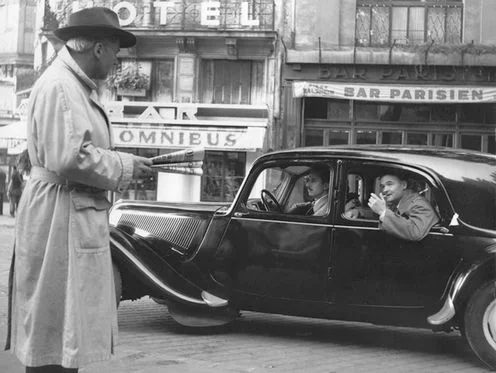 |
| Jean-Paul Belmondo and Charles Vanel in Magnet of Doom |
I don't know what the title Magnet of Doom means -- the original French title is L'aîné des Ferchaux, which means "The elder Ferchaux" -- but its elusive quality seems about right for Jean-Pierre Melville's shaggy dog of a movie. Ostensibly a thriller, a genre of which Melville was a master, Magnet of Doom meanders as much as the road trip which its central characters, Michel Maudet (Jean-Paul Belmondo) and Dieudonné Ferchaux (Charles Vanel), set out upon. Especially in its peregrinations through the United States, it reminds me a bit of Wim Wenders's Alice in the Cities (1974) and even more of Jim Jarmusch's Stranger Than Paradise (1984), two films that I suspect owe a bit to Melville's movie, and even more to Henri Decaë's cinematography for it. The story, such as it is, details the flight from prosecution in France of crooked banker Ferchaux, accompanied by Michel, a young man he hires as a secretary. Since Michel is a lean, lithe ex-boxer played by lean, lithe ex-boxer Belmondo, there's a touch of homoeroticism in Ferchaux's choice of secretary, especially since the interview is perfunctory and it becomes clear that Michel doesn't really know how to type -- he does it with two fingers. Mostly Michel's job is to drive Ferchaux on his trip through the States to New Orleans. At the outset, Michel is taciturn and submissive, doing Ferchaux's bidding without question. But after they make a stop at a bank in New York City where Ferchaux has a safe-deposit box full of cash that he loads into a suitcase, Michel begins to assert himself a little: One of his first stops on their trip is in Hoboken, N.J., so he can see the birthplace of Frank Sinatra, whom he idolizes. And after they pick up an improbably pretty hitchhiker named Angie, played by Stefania Sandrelli, he begins to turn the tables on Ferchaux, ordering the older man into the back seat and stopping to go for a swim in a river with Angie. Ferchaux regains control, however, by flinging the cash from the suitcase off a cliff, holding on to a wad of money that he can use to maintain dominance. Michel and Angie clamber down the hill to retrieve what they can of the money. But when they stop at a service station and Michel goes to the restroom while Ferchaux dozes, Angie absconds with the suitcase containing the recovered cash and hitches a ride with a trucker. Michel gives chase and outruns the truck, gets the money back, and orders the trucker to leave and Angie to resume hitchhiking. The rest of the film is a series of power plays between Ferchaux and Michel as they wait in a cabin near New Orleans for the arrival of the money Ferchaux has arranged to be sent to him upon the closing of his main account in New York, after which they plan to avoid extradition by taking up residence in Venezuela. But the older man begins to suffer health problems and Michel starts to collaborate with the authorities who are pursuing Ferchaux. This summary makes the film sound more cut-and-dried than it is, however. The pacing is, if not off, at least off-beat, sometimes engaging, sometimes lethargic, and sometimes frustrating. Melville's take on America makes it worth watching, and the performances of Belmondo and Vanel are as good as one might anticipate. It's the kind of film you watch just to try to anticipate what's going to happen next, and you usually can't.



















